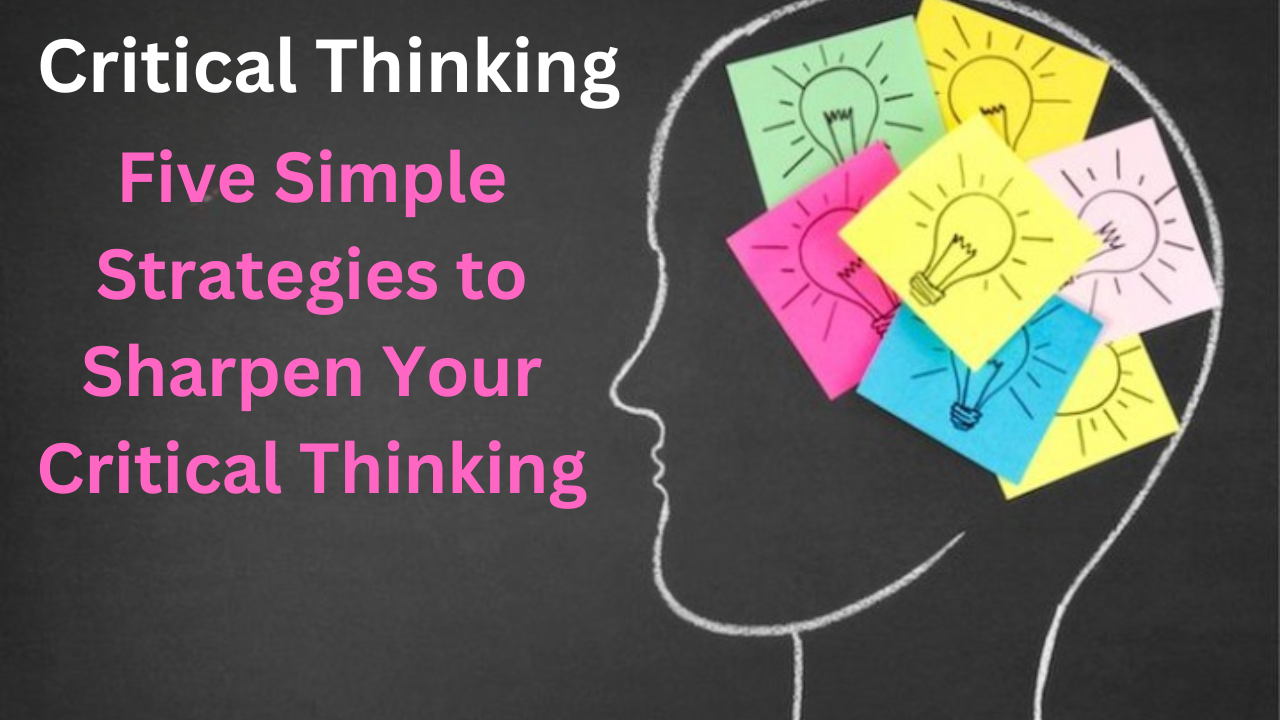An essential ability for situation analysis well-informed decision-making and efficient problem-solving is critical thinking. Enhancing your critical thinking abilities can benefit both your personal and professional life regardless of whether you’re a professional student or just trying to get better at making decisions. Fortunately anyone can practice and improve their critical thinking skills. Here are five easy ways to get you going.
Question Assumptions:
One of the first steps in critical thinking is to challenge assumptions. Many times people accept concepts or opinions without challenging their accuracy. However critical thinking requires challenging these assumptions and considering them from multiple perspectives.
How to Practice:
- When faced with a problem or situation, ask yourself, “What assumptions am I making?”
- Consider alternative explanations or viewpoints. Are there other possibilities that you haven’t considered?
- Before accepting information as fact, question the source. Is the information reliable, or could it be biased?
You’ll be more capable of assessing circumstances with greater clarity and openness if you regularly challenge presumptions. This increases your capacity for thoughtful decision-making and keeps you from succumbing to the trap of automatic thought.
Gather and Analyze Information:
Before coming to a conclusion critical thinkers consider all available data. Poor results can result from making decisions or forming opinions based on incomplete or erroneous data. Seek out accurate trustworthy information and carefully consider it before drawing conclusions in order to hone your critical thinking abilities.
How to Practice:
- Take time to research a topic before forming an opinion. Look at multiple sources, and try to get information from reputable sources such as academic journals, reliable news outlets, or expert opinions.
- Compare different points of view and weigh their credibility. What evidence is provided to support each argument?
- Break down complex information into smaller, manageable parts, and assess each one critically.
You’ll gain a more impartial grasp of the situation and strengthen your capacity for reasoned decision-making by meticulously obtaining and evaluating information.
Think in Terms of Cause and Effect:
A crucial part of critical thinking is comprehending cause and effect. Finding practical solutions is made easier when you can precisely pinpoint the source of an issue. By anticipating possible outcomes cause and effect thinking also helps you avoid unintended consequences.
How to Practice:
- When examining a problem, ask yourself, “What caused this situation?” and “What will likely happen if I take a certain action?”
- Create a cause-and-effect chart to visualize how different factors interact and influence each other.
- Look for patterns. Does the same cause consistently lead to a specific effect? Are there external factors at play that you need to consider?
Your critical thinking skills will be much enhanced and you will be able to approach problems more methodically if you can learn to identify patterns and connections between events.
Engage in Active Listening:
A critical thinking technique that is essential is active listening. It entails giving the other person all of your attention comprehending what they’re saying and giving a considered response. You’re more likely to discover fresh perspectives acknowledge opposing ideas and challenge your own prejudices when you actively listen.
How to Practice:
- When having a conversation or listening to someone’s opinion, avoid interrupting or thinking about your response while the other person is speaking.
- Reflect on what the person is saying and ask clarifying questions to ensure you fully understand their perspective.
- Take note of any biases or assumptions you may have and challenge them in light of the new information.
You can improve your critical thinking skills forge closer bonds with others and communicate more successfully by practicing active listening.
Practice Reflective Thinking:
Stepping back from your own thought processes is a necessary part of reflective thinking. It involves thinking back on your process of arriving at a conclusion and evaluating the soundness of your reasoning. Through reflective thinking exercises you can pinpoint areas where you might have erred in judgment or missed crucial information.
How to Practice:
- After making a decision or solving a problem, take time to reflect on the process. Ask yourself, “Did I consider all the relevant information?” and “Were my conclusions based on solid reasoning?”
- Keep a journal where you regularly reflect on your decisions, thoughts, and experiences. This practice will help you recognize patterns in your thinking and identify areas for improvement.
- Be open to feedback from others and consider their perspectives when reflecting on your decisions.
You can enhance your critical thinking abilities and become more conscious of your cognitive biases by implementing reflective thinking into your daily routine.
Conclusion:
Sharpening your critical thinking skills doesn’t happen overnight, but with consistent practice, it’s a skill anyone can develop. By questioning assumptions, gathering and analyzing information, thinking in terms of cause and effect, engaging in active listening, and practicing reflective thinking, you can enhance your ability to evaluate situations and make more informed decisions. These simple strategies will not only improve your critical thinking but also empower you to navigate complex problems and challenges with greater confidence.
